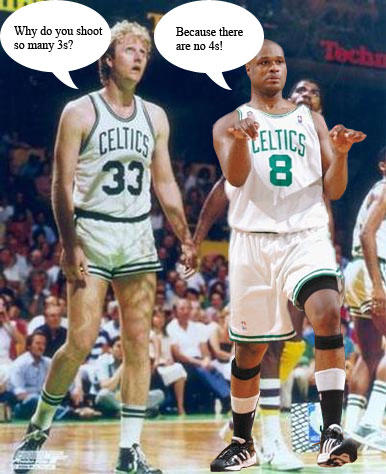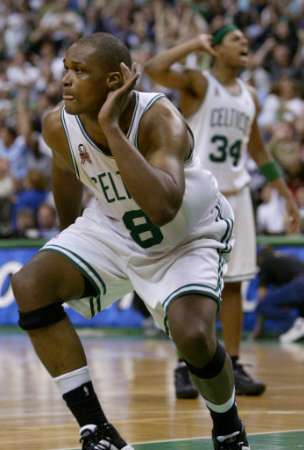Re: The Forgotten STAR - Antoine "The Captain" Walker
Olen pitkään seurannut kuinka Walkeria on tällä forumilla haukuttu, potkittu ja epäkunnioitettu. Tietämättä Walkerista boxscorea enemmän hänet on leimattu luuseriksi ja itsekkääksi paskaksi. On ollut kuvottavaa lukea täällä (nimeltä mainitsemattomien) käyttäjien tekstejä miehestä, jonka sydän on kultaa. Ehkä tämän luettuanne ymmärrätte, miksi Walker ei ole ainoastaan mahtava pelaaja, vaan hänellä on myös All-Star tason sydän.
------------------------------------------------------------------------------------------------
Antoine Walker has passion for basketball, and love for family
You never need a reason to shimmy.
You can shimmy while waiting in a restaurant, after sinking a big shot, or even during a stroll down the Strip.
"He sponsors my AAU team, and helps me coach when we go to Las Vegas," Tobias Walker says of older brother Antoine. "And if we hear music playing, he will stop in the middle of the street, with all those people, and start dancing. It's the funniest thing to see someone 6-9 who can really dance."
And who definitely dances to his own distinctive beat.
"He's real goofy," Tobias says.
The 29-year-old is many other things, too, far more than come across in the single-dimensional caricature of a shot-happy NBA forward.
Yes, Walker, who tonight faces one of his former teams, the Dallas Mavericks, is goofy. His sister Tywanna says "he loves to dance, loves to have a good time," the latter meaning video game playing, soap opera viewing and obsessive golfing.
But the new Coconut Grove resident is also serious, about studying his sport and planning his post-basketball future.
He's competitive, in every imaginable endeavor, so much so that Tobias calls losing to him "the worst thing in the world. You'll hear about it the rest of your life."
He's sentimental, valuing mementos, including a photo with David Stern on draft day.
He's sensitive to criticism: "I think sometimes people don't understand, that as athletes, you're human too."
More surprisingly to some, perhaps, is how sensitive he is in another sense.
What's the one thing Tobias learned from his brother?
"Family first. Always."
Antoine was the first of six children born to Diane Walker, who did clerical work for the city of Chicago. She made little, but worked much. Walker's father, Dennis, wasn't around. Gangs and drugs were. Tobias remembers the neighborhood as a place where "you always had to watch your back." It didn't help that their uncle, Chico, had made the major leagues, or that Antoine began excelling at basketball. That only exacerbated local jealousy.
"They see somebody they knew coming up, and they didn't like it," Tobias says.
Walker remembers a "very poor environment," where he learned to value everything his mother could provide. She managed to keep the kids in Catholic schools, and encouraged athletics to keep them off the street. And Antoine always got one thing he wanted, even if the cost was close to $100: a pair of gym shoes he would wear with everything. So long as they fit.
"His feet kept up with his age," Diane says.
His maturity needed to exceed it. She taught him to iron clothes and cook for siblings.
"I kept it basic," he says. "Hamburgers, chicken, stuff that wouldn't get me in too much trouble. I did enough to hold us over."
He got help from across the street, where Diane's mother, Dorothy, lived.
"She was the backbone of the family," Tywanna says.
She was something else .....
"Very close to Antoine," Diane says.
Their bond formed when Dorothy would babysit him, and strengthened during countless chats on the porch, about how to treat others right.
When it came to basketball, "I could never do anything wrong," Walker recalls. "We used to lose, and she always would say something to me that made me feel like I won. That was something very special, every night, to talk to her after every game."
Her grandson's special skills, displayed at Mount Carmel High, earned a scholarship to Kentucky. After three months of homesickness, he came to enjoy college, though "after about that third or fourth econ class" he changed course from business to social work.
His sophomore season ended in a national championship, and he convinced his mother it was time to go pro, to capitalize on his high stock and provide for his daughter Crystal.
"I had to grow up fast," says Walker, who became a father at 17.
"I understood," Diane says.
The Celtics drafted him sixth overall, and he developed into an All-Star and co-captain. Still, he had never really left Chicago, or that porch. So when Dorothy suffered her second stroke in 2001, fans and teammates saw his sensitive side.
"That hit him very hard," Diane says.
Dorothy had been active, so he was sure she could beat it. She didn't. Many organizational members attended the funeral, much to his appreciation. He unexpectedly returned the next day to score 36, with 11 rebounds and eight assists. In her honor, he made another vow.
"She was a huge family person, as far as making sure her kids were taken care of," he says. "So I just assumed that responsibility."
The assists kept coming.
Already, he had used his first contract to retire his mother, buying her a home and car, even as she expressed a desire to keep working.
"This is something I want to do," he had told her.
His list of desires has only grown larger since his grandmother's passing. He has bought two apartment complexes to house several related families, paying bills and providing an allowance. He has paid college and prep school tuitions.
He, along with former high school coach Mike Curta, have run a basketball camp, with Walker bussing kids to Curta's school and bankrolling lunch and coaching fees.
"No kid pays a dime," Curta says. "The guy's gold."
When Curta's son Nicholas went in for minor heart surgery earlier this year, Walker sent a gift, and called just before and right after.
These days, Diane Walker lives in a new $5 million house in Chicago's south suburbs.
"He takes care of everybody," Diane says. "That's most touching for me. He's my blessing."
He has sponsored, and coached, several AAU teams, because when he was growing up, it was hard to get such funding. His "8 Foundation," started in 1997, raises money for inner-city youth through billiards, casino and golf tournaments, and he headlines the charity Chicagoland All-Star Classic similar to Zo's Summer Groove. Now, with the help of the city, he envisions a Chicago community center similar to what Mourning helped open in Overtown. It will be geared to helping single-parent mothers like his own, and her own, by offering tutoring, computer and recreational programs.
"I would trade everything in for that," he says.
He has started a venture capital firm, but, while dabbling (working with an Internet company, an alarm company, a few radio stations), he is remaining cautious until he retires.
"I'm learning," he says. "When my career is over with, I'm still going to be in my thirties, so I can actively get involved. Right now, I don't want to get crazy with it. My concept was to have something in play."
For now, he still loves playing.
"Probably too much," he says. "I have a passion for it."
The day he doesn't, he'll be done. He suspects that passion sometimes leaves the wrong impression, whenever it shows up on his face in the form of frustration.
The perception of selfishness?
"It bothers me," Diane says. "It really does. Because you know your child. If he was that type of person, I would say so." Sure, Tywanna jokes, he grabs French fries off her plate. Otherwise, all the Walkers see, off the court, is selflessness. And that softer side.
That family side.
He speaks to his mother after every game. He even calls himself "close" with his father, who has remarried.
"He wasn't around, I guess, during the important years," he says. "But I'm not one of those persons who is going to just disassociate myself, because we're still a family. And now, being a father, being a professional athlete, if you're not a married person, you kind of understand some of those situations, because you can't be there all the time."
Walker's daughters, Crystal and Alana, are 11 and 7, and live in Chicago. He's always around for their first six school weeks, and makes a point to meet their teachers. He picks the girls up a couple of days per week, "just so the other kids know their father is around." During the season, he sees them during Midwest trips and holiday breaks. Every few weeks, Diane takes them to him.
"And we talk on the phone a lot," he says. "I just got my 11-year-old a cell phone, which I was scared to do. I had to. She begged me for it."
How could he resist?
Family first.


